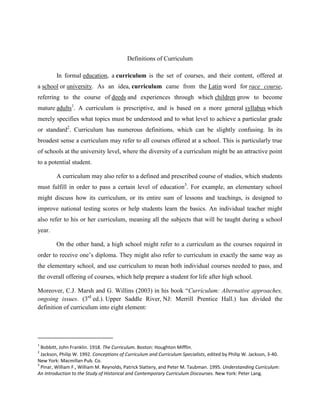
Definitions of curriculum
- 1. Definitions of Curriculum In formal education, a curriculum is the set of courses, and their content, offered at a school or university. As an idea, curriculum came from the Latin word for race course, referring to the course of deeds and experiences through which children grow to become mature adults1. A curriculum is prescriptive, and is based on a more general syllabus which merely specifies what topics must be understood and to what level to achieve a particular grade or standard2. Curriculum has numerous definitions, which can be slightly confusing. In its broadest sense a curriculum may refer to all courses offered at a school. This is particularly true of schools at the university level, where the diversity of a curriculum might be an attractive point to a potential student. A curriculum may also refer to a defined and prescribed course of studies, which students must fulfill in order to pass a certain level of education3. For example, an elementary school might discuss how its curriculum, or its entire sum of lessons and teachings, is designed to improve national testing scores or help students learn the basics. An individual teacher might also refer to his or her curriculum, meaning all the subjects that will be taught during a school year. On the other hand, a high school might refer to a curriculum as the courses required in order to receive one’s diploma. They might also refer to curriculum in exactly the same way as the elementary school, and use curriculum to mean both individual courses needed to pass, and the overall offering of courses, which help prepare a student for life after high school. Moreover, C.J. Marsh and G. Willins (2003) in his book “Curriculum: Alternative approaches, ongoing issues. (3rd ed.). Upper Saddle River, NJ: Merrill Prentice Hall.) has divided the definition of curriculum into eight element: 1 Bobbitt, John Franklin. 1918. The Curriculum. Boston: Houghton Mifflin. 2 Jackson, Philip W. 1992. Conceptions of Curriculum and Curriculum Specialists, edited by Philip W. Jackson, 3-40. New York: Macmillan Pub. Co. 3 Pinar, William F., William M. Reynolds, Patrick Slattery, and Peter M. Taubman. 1995. Understanding Curriculum: An Introduction to the Study of Historical and Contemporary Curriculum Discourses. New York: Peter Lang.
- 2. Definition 1: Curriculum is such “permanent” subjects as grammar, reading, logic, rhetoric, mathematics, and the greatest books of the Western world that best embody essential knowledge. Definition 2: Curriculum is those subjects that are most useful for living in contemporary society. Definition 3: Curriculum is all planned learnings for which the school is responsible. Definition 4: Curriculum is all the experiences learners have under the guidance of the school. Definition 5: Curriculum is the totality of learning experiences provided to students so that they can attain general skills and knowledge at a variety of learning sites. Definition 6: Curriculum is what the student constructs from working with the computer and its various networks, such as the Internet. Definition 7: Curriculum is the questioning of authority and the searching for complex views of human situations. Definition 8: Curriculum is all the experiences that learners have in the course of living. In Addition, the Scholars in The Field has the different definition of the curriculum: Tanner (1980) defined curriculum as “the planned and guided learning experiences and intended outcomes, formulated through the systematic reconstruction of knowledge and experiences under the auspices of the school, for the learners’ continuous and wilful growth in personal social competence” (p.13). Schubert (1987) defines curriculum as the contents of a subject, concepts and tasks to be acquired, planned activities, the desired learning outcomes and experiences, product of culture and an agenda to reform society. Pratt (1980) defines curriculum as a written document that systematically describes goals planned, objectives, content, learning activities, evaluation procedures and so forth. Goodlad and Su (1992) define curriculum as a plan that consists of learning opportunities for a specific time frame and place, a tool that aims to bring about behaviour changes in students as a result of planned activities and includes all learning experiences received by students with the guidance of the school.
- 3. Cronbleth (1992) defines curriculum as answering three questions: what knowledge, skills and values are most worthwhile? Why are they most worthwhile? How should the young acquire them?